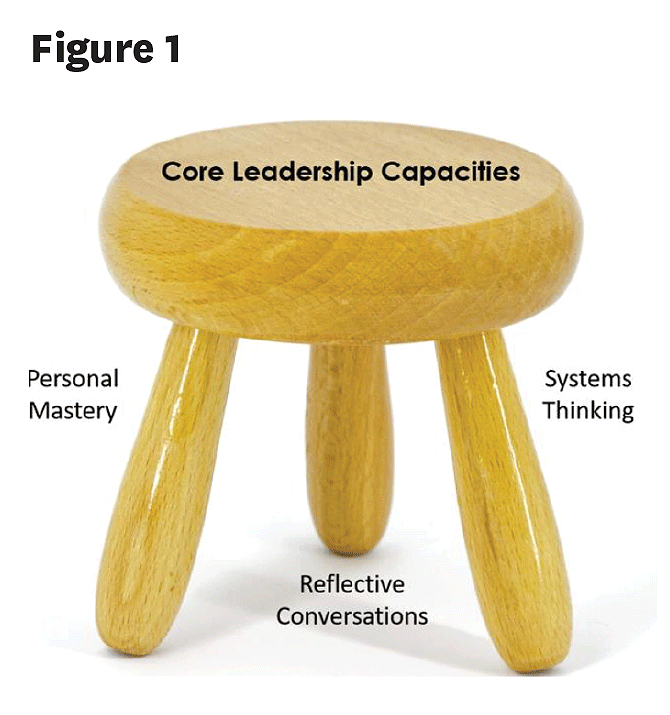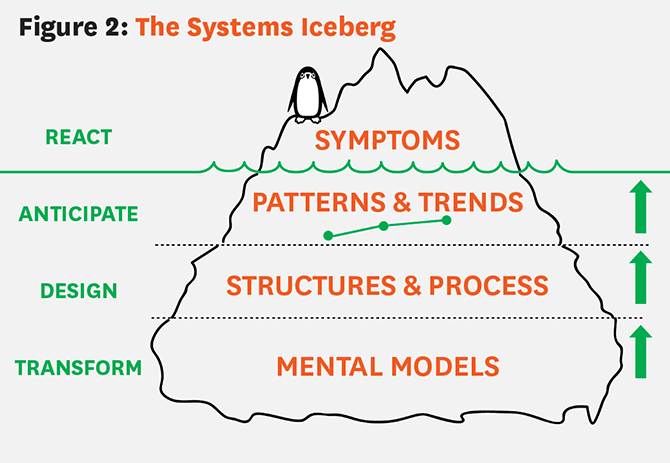Compassionate Systems Leadership
Leveraging disruption for transformative change
What else can be said about our experiences since the onset of the pandemic? “Unprecedented, stress producing, disrupting, mind boggling, unimagined.” All of the descriptors of our current context have been used and overused. Yet somehow the magnitude of it all never seems quite properly conveyed. The pandemic has shone a light, as rarely before, on the possibilities and opportunities for innovation and change in the education system. And we are all engaged in thinking about how we can respond in ways that not only address immediate needs but also capitalize on the opportunity for much larger and more significant innovation.
As children and teachers return to the classroom, we have searched for an accurate description of the impact of the pandemic on the education system and all the people within it. COVID-19 has exacerbated existing stressors and challenges as administrators, educators, and support staff return to school: it has been tough, really tough. Regular routines have been disrupted; the needs of many learners have increased, and those with special needs especially so; the need to be innovative and try new things, though exciting, has also depleted energy; children are experiencing high levels of anxiety and sadness.
Simultaneously though, the disorder presents us with an extraordinary opportunity to consider actions that are capable of transforming the system in ways that we could not have envisaged at the start of 2020. We have a chance now, from this place of disruption, to create a new kind of environment; one that is compassionate and nurturing as an essential foundation for learning; one that focuses on our shared humanity and provides continuous collaboration and learning for both students and educators; one that is grounded in an understanding of the complexity of the education system and acknowledges this in all of the decisions that need to be made.
Compassionate Systems Leadership (CSL) is a framework that can facilitate such a transformation. CSL is an approach to educational leadership that explicitly builds skills and practices in three interconnected domains (see Figure 1) that are required in this new reality: self (building a practice of personal reflection, mindfulness, and compassion), each other (building authentic relationships that can support generative conversations), and the system (developing skills and capabilities to use tools that honour the complexity of the work that needs to be done).

CSL draws on practices that are similar to those that have proven effective in building teacher well-being and supporting the social and emotional capacity of learners. It extends these to include the strengthening of interpersonal relationships, while deepening the understanding of how the system can perpetuate, rather than diminish, stress in the workplace. CSL can shift us out of that continuous cycle of doing what we can to take care of ourselves, while always returning to a structure that does not take care of the health and well-being of the people within it.
Self
The foundation of CSL is a continuous practice of mindfulness and reflection. It draws on the premise that increasing the awareness of ourselves as leaders – our values and beliefs, our passions and our challenges – allows us to become more alert to how we are “showing up” at work every day and how our behaviour and approach might be impacting those around us. CSL uses simple tools to build this awareness. It encourages a practice of personal mindfulness meditation (the deep skill of pausing, understanding our emotions and thoughts, and responding from a place of clarity), and regular reflective journaling.
Each other
The CSL process also introduces practices that facilitate awareness and deeper, more authentic, and trusting relationships amongst groups of colleagues: these are essential to more courageous systems work. For example, “Check-in” (See Steps in Facilitating a Check-In) is a CSL tool that is simple and powerful. It creates the time and space for each person to share their thoughts and emotions without judgment. It creates a place where all those involved can bring their whole selves into the work. It asks that we practise the basic skills of intentional speaking and listening that can generate a new and shared personal understanding with our colleagues. The CSL approach also supports a curiosity into the possibility for more transformative conversations that take us beyond our existing ways of thinking and solving problems into a more aspirational approach that can encourage more innovative and creative solutions.
Steps in Facilitating a Check-In
- First, open up by asking a group of people to take two to five minutes to individually and quietly reflect on a guiding question. You can also do this as a simple guided meditation.
- Next, take time (five minutes) to journal whatever comes to mind. Maintain silence throughout the journaling time.
- Place everyone into groups of three to five (either in small circles or in virtual breakouts), and take one to two minutes per person to share personal reflections. Encourage people to share only what they are comfortable with and to listen without judgment or interpretation, only to understand and hold what people have to say.
SYSTEM
The core concepts of systems thinking (Meadows, 2008; Stroh, 2015) that are included in the CSL framework provide a broad set of tools for viewing the challenges and opportunities faced by schools and the system more generally at the moment. CSL incorporates a series of practices and concepts that facilitate perspective taking (from multiple perspectives), deepen knowledge about systemic behaviour, and illuminate the patterns that often lead to us into a continuous cycle of frustration and powerlessness, where we keep on doing the same things and getting the same outcome. One such concept is the Systems Iceberg (see Figure 2). This concept provides a structure to explore and unpack the system challenges that consume too much time and energy, and yield little progress. The iceberg moves us from seeing daily events, to understanding the patterns in these events and then digging deeper to understand the structures, processes, values, and beliefs that continue to generate non-optimal outcomes and leave us feeling stuck.

The CSL framework that we are developing in B.C. is a compilation of the work of many others. It is connected to the work of Peter Senge (2006) and Mette Boell at the Centre for Systems Awareness at the Massachusetts Institute of Technology. Through the Centre, a global community for systemic change in education is developing. In B.C. we have also integrated an approach to cultivating compassion that was developed at Stanford University and the Cultivating Compassion Institute based in California. And we are grateful to be able to draw on tools and approaches developed by Otto Scharmer (2018) (Theory U), Robert Fritz (1989) (Creative Tension), and others.
We are testing and applying this emerging framework with educators and other child-serving professionals in B.C. The B.C. Ministry of Education recently incorporated a CSL component in its Mental Health in Schools strategy. Through a robust and growing Community of Practice of educators and professionals from a range of sectors, which meets on a regular basis, we are continuously adapting the approach to integrate shared learnings and best fit the systemic context of participants. Our discussions and emergent practice focus on collaborative learning. And we are grounded in the idea that “we are the system,” that what we each do, individually and collectively, is an essential contribution toward meaningful and effective systemic change. We are also connected in a common commitment to approach the work ahead of us with an intention toward kindness and compassion (Jinpa, 2016); cultivating compassion for ourselves and for those we connect with every day is an essential foundation for the transformation that we seek.
Curious to know more? Check out the website: compassionatesystemsleadership.net
Photo: iStock
First published in Education Canada, January 2021
REFERENCES
Fritz, R. (1989). Path of least resistance: Learning to become the creative force in your own life. The Random House Publishing Group.
Jinpa, T. (2016). A fearless heart: How the courage to be compassionate can transform our lives. Penguin Random House LLC.
Meadows, D. (2008). Thinking in systems: A primer. Chelsea Green Publishing.
Scharmer, O. (2018). The essential of Theory U: Core principles and applications. Berret-Koehler Publishers, Inc.
Senge, P. (2006). The fifth discipline: The art and practice of the learning organization. Crown Business.
Stroh, D. (2015). Systems thinking for social change: A practical guide to solving complex problems, avoiding unintended consequences and achieving lasting results. Chelsea Green Publishing.
